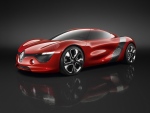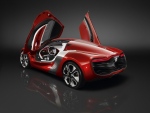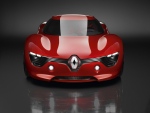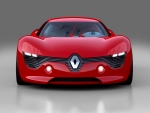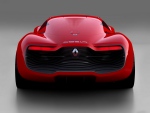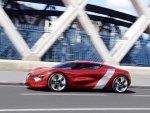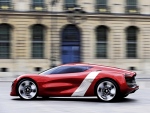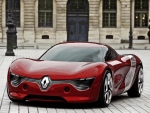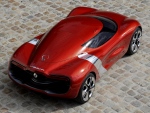2010 Renault DeZir Concept
2010 Renault DeZir Concept Pictures & Specifications
Home »
Renault
Picture Gallery
Technical Specifications
Model: DeZir Concept
Engine: Electric
Battery: Lithium-ion
Power: 110 kW (150 hp)
Torque: 226 Nm (167 lb-ft)
Transmission: Direct drive with reducer and forward/reverse inverter
Drivetrain: Rear-wheel drive
Range: 161 km (100 Mi)
Length: 4225 mm
Width: 1968 mm
Height: 1163 mm
Wheelbase: 2582 mm
Kerb weight: 830 kg
0-62 mph (0-100 km/h): 5 seconds
1/4 mile (0-400 metres): –
Top speed: 112 mph (180 km/h)
Styling Shift: From DeZir To Reality
Renault Press Release
September 2010
DeZir is the first project to have been led by Laurens van den Acker and marks the beginning of a sequence of concept cars that will provide an insight into Renault’s new styling vision for the future. It also lays the foundations for the design cues of the brand’s forthcoming vehicles.
The DeZir concept car illustrates the brand’s commitment to styling which illustrates the three keywords that communicate the brand’s vision, namely ‘simple’, ‘sensuous’ and ‘warm’. Indeed, DeZir’s sensuous lines and bright red finish are suggestive of the passion that cars have always inspired.
Powered by an electric motor, this sports coupe combines respect for the environment with undeniable elegance.
Renault DeZir: the first illustration of Renault’s new styling vision for the future
Under the leadership of Laurens van den Acker, Renault Design took its inspiration from the brand’s new signature ‘Drive the Change!’ to explore the brand’s styling roots and convey a more emotional dimension.
Behind the beauty, an electric car
The ‘Z’ in the name DeZir is a direct reference to Renault’s Z.E. signature, and several features of its design are suggestive of two qualities readily associated with electric mobility, namely advanced technology and light weight.
To provide rhythm and balance to the overall package, its smooth, fluid skin contrasts with the ripple effect employed for the aluminium side panels, roof and headlight ‘eyelids’.
DeZir’s front end features a full-width air-intake that strikes out either side of a large, vertically positioned Renault logo which proudly asserts the car’s pedigree. Meanwhile, the chrome finish of the diamond contrasts with the dark aspect of the grille to express the statement still further. The headlights take the form of backlit prisms, which make them a highly graphic feature. The frontend design provides a glimpse of the new front-end identity which is poised to become a feature of all Renault models in the future.
Rear lighting is provided by an illuminated, seemingly floating strip that extends across the full width of the car. The Renault logo is highlighted by backlighting through the fins of the grille and consequently appears to hover in the middle of this space.
The interior design also suggests lightness. The forms are soft and light, and the predominant colour is white, although there are also echoes of the same passion red used for the exterior. The materials employed for the interior, like the senses they awaken, are precious, with white leather upholstery and trimming for the seats, dashboard and floor, along with a red lacquered finish for the console and accessories.
The one-piece, two-seater front benchseat provides cocoon-like comfort and comprises a number of interlocking elements trimmed in white leather, with a quilted pattern on the passenger’s side, and a contrasting uniform finish on the driver’s side, as if to suggest an inexorable attraction between the two.
The interior styling takes its inspiration from the idea of an amorous encounter and is based on a coming together of opposites.
The cockpit-style driver’s environment contrasts with the ethereal lightness of the dashboard and the sensuous feel of the white leather bench seat that seems to float on a red-hued bed of light which, once again, symbolises passion. This lighting gently pulses to a rhythm suggestive of a beating heart. The dashboard visually mirrors the sensations felt at the wheel by means of a graphic display of data received from the accelerometer and speed sensors. The central touch screen display incorporates a smart navigation system that synchronises journey information with the driver’s diary in order to optimise task management and itineraries.
Special software provides drivers with a real-time indication of their energy management ability via a fun interface incorporated in the dashboard that uses video-game style graphics.
An electric beauty
Renault DeZir is powered by an electric motor mounted in a mid-rear position to optimise weight distribution over the front and rear wheels. The vertically-mounted 24 kWh lithium-ion battery is located behind the benchseat and provides the car with a range of 160 km.
The basic motor is the same as the unit used for Renault’s production electric cars, although an evolution has enabled its power and torque to be uprated to 110 kW (150 hp) and 226 Nm respectively. In order to optimise range and dynamic performance, Renault Design’s technical teams have kept DeZir’s weight to a minimum: its body is made from Kevlar, while its tubular steel frame is similar to that employed for the Megane Trophy race car.
DeZir’s suspension also shares certain features with that of Megane Trophy – including a double wishbone arrangement – to deliver a particularly high standard of handling precision.
DeZir’s aerodynamics have been carefully honed, too, thanks to full underbody fairing and a rear diffuser. The result of this work is a drag coefficient (Cd) of 0.25, plus outstanding acceleration, with DeZir capable of accelerating from rest to 50 km/h in a mere two seconds.
DeZir’s energy efficiency package also includes the recovery of braking energy. The technology it employs is based on the same principles as the KERS (Kinetic Energy Recovery System) seen in Formula 1. When the car decelerates, kinetic energy is recovered and stored in the battery. As is the case in F1, this energy can then be employed by the driver to provide a temporary power boost thanks to a button located on the steering wheel.
